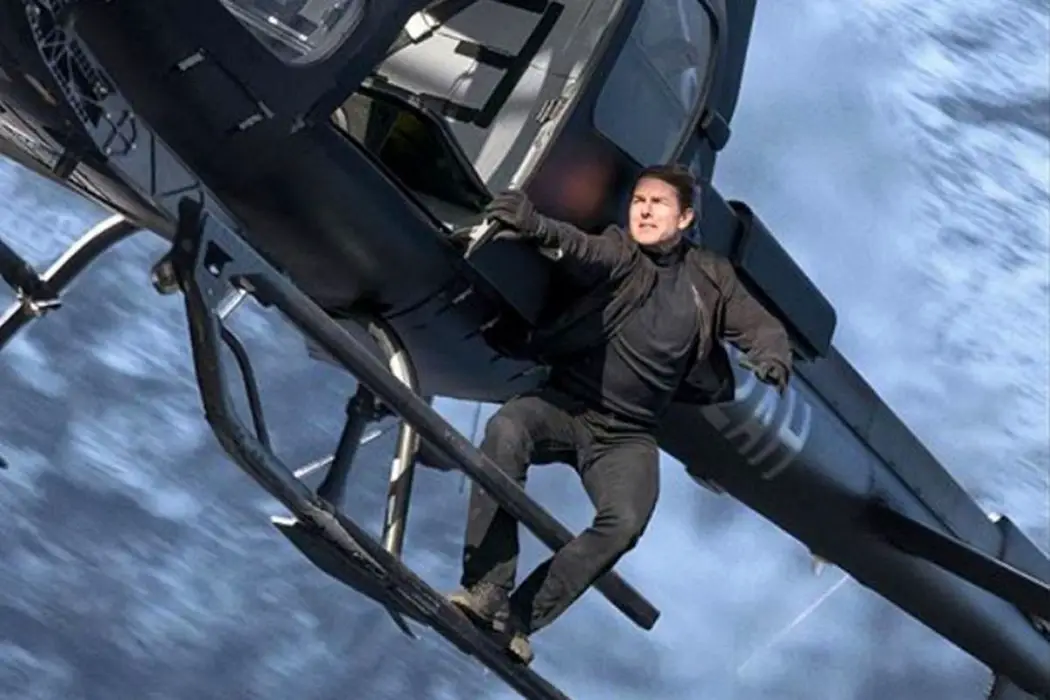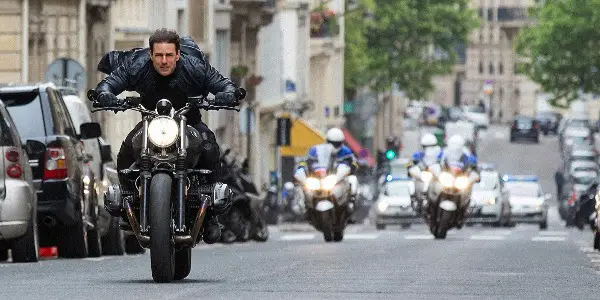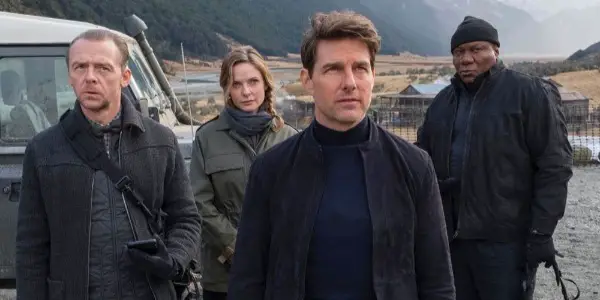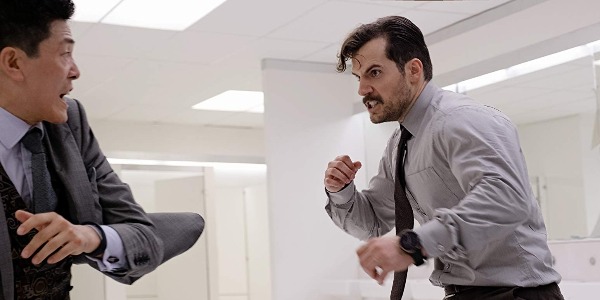MISSION: IMPOSSIBLE – FALLOUT: Practical Effects Save The Day

Alex is a film addict, TV aficionado, and book lover.…
Despite the incessant grumbling about sequels, prequels, and universes, hardly anyone is complaining about another Mission: Impossible movie. Six films deep and over twenty years old, the series has morphed into a bastion of old-school (i.e. live) stunts and relentless action. They would seem quaint if the rest of blockbuster filmmaking hadn’t gone in an entirely different direction, so in the age of CGI and bloated plots, Mission: Impossible – Fallout comes in like a breath of fresh air.
Or more accurately, it is huffed and puffed in by Tom Cruise, who flings his body around so much for our entertainment that asking for more kind of feels like callous prodding. He notably broke his ankle while making Fallout, delaying production and causing Henry Cavill’s face to look like Play-Doh in Justice League. And yet still we applaud when Cruise clings to helicopters and takes punches from guys twice his size, because at the end of the day, much of this series’ pleasure comes from putting Tom Cruise’s body on the line.
For some reason he seems happy to oblige, once again doing all the running, driving, and face switching we’ve come to expect from the series. That everything seems familiar isn’t a detriment; most people are happy with Mission: Impossible greasing the wheel, not reinventing it. Luckily, that’s precisely what Fallout does, delivering an incessantly paced thrill ride that just barely doesn’t reach a series peak.
May The Countdown Never End
While being a full-on action series, Mission: Impossible has never thrived on gigantic set pieces. Explosions and crumbling buildings are exceptions to the rule, instead basking in the more sustained tension that comes from chess pieces moving around a board. At its best, its sequences involve a clear target, a Rube Goldberg-esque plan to acquire said target, and a ticking clock. Think Cruise’s Ethan Hunt scaling the Burj Khalifa in Ghost Protocol or the underwater sequence in Rogue Nation. Both have simple goals, and both are breathtakingly thrilling.

The anti-bang of its action requires more classical skill from its filmmakers, with the beats of a sequence’s setup and escalation needing to be hit with minute precision to get a big payoff. It’s the same as timing a joke, which is why the thrill of a good Mission: Impossible movie is so similar to the giddy laughter generated by the Paddington series. Both are examples of films mastering the fundamentals of their genre, so anyone thrilled by the mechanics of how filmmaking works are in for an extra treat with both.
Even if you aren’t into breaking down why a movie did or didn’t work, Fallout will still delight you with how much action it delivers, and that’s in no small part thanks to director Christopher McQuarrie. He proved he had the stuff to pull off a top-notch Mission: Impossible with Rogue Nation, and as the first director to return in the series, he largely meets the sky-high expectations for Fallout.
Businesslike exposition at the beginning of the film lays out the team’s broad goal, and the steps needed to accomplish it come fast and furious. McQuarrie has proven to be nothing if not an efficient filmmaker, gifting Fallout with little flab, even at two and half hours in length. Developments both personal and professional roll right into the next, so even though the individual sequences aren’t as crisply laid out as they were in Rogue Nation, the movie overall never lags.
This pattern of smaller tasks building up to the larger solution has proven sustaining for the series, and that McQuarrie (who also wrote the screenplay) links them so smoothly is Fallout’s biggest asset. There’s little time to breathe or think, which sweeps the film’s minor flaws under the rug too fast for them to register. As long as that clock is ticking, this film is a joy, and that clock ticks pretty much the entire time.
Shut Up And Play The Hits
Familiarity with the Mission: Impossible franchise will undoubtedly enhance your enjoyment of Fallout, but it isn’t necessarily required homework. Rolling in with vague knowledge is enough, if only because it’s sort of optional to follow the plot of these movies. They play just fine as visceral experiences, but considering they have so many trademark moves, being in on the game does add a certain warm, fuzzy feeling.

Perhaps its most common trick is the face/voice swap, which at this point is so canonical that it isn’t even explained. Entire scenes happen in Fallout only to have someone’s hand go up towards their head, instantly setting off an internal squeal of delight (or maybe external, let’s not judge) from fans. They know Cruise, Simon Pegg, or some other member of the team is about to be revealed and the entire scenario is being flipped on its head. It’s a move that otherwise would be a cheap manipulation of the audience, but here, it’s an agreed upon bit of fun. We’ve willingly been fooled, and McQuarrie and team always delightfully play up the reveal.
Everything about Fallout is good old-fashioned movie magic, really, with expert framing allowing scenes to open and close on a dime and the score rocking us from beat to beat. We know there will be a double/triple/quadruple cross and Cruise will eventually save the day because it’s Mission: Impossible. Fallout has the same basic premise as all the preceding movies, and it moves through its familiar beats with a wink and a smile. This levity allows the audience to consume the intense action and walk away without a care in the world, because the only thing being taken seriously here are the thrills.
Treading Too Close To Modernity
For all of the things Fallout holds on to, there are minor attempts to move this entry closer to what blockbusters are today, and they’re largely to the film’s detriment. With superheroes dominating the big screen for years, they’ve all begun turning towards questions of morality, of whether their super powers entitle them to make broad decisions on behalf of humanity. Fallout, despite never giving Cruise’s Hunt a whiff of imperviousness, does hype up his importance to the world and force him to confront similar questions as his superhero contemporaries.

Pumping up his influence feels out of place in the series, especially when the action constantly downplays Hunt’s control of the situation. As he pinballs from problem to problem, there’s a running thread of him trying to minimize unnecessary casualties, especially to innocent bystanders. This puts him in stark contrast to the CIA tagalong played by Henry Cavill, whose stiff turn and imposing physique only makes his character stick out more. In many ways these two are counterpoints, and the film makes clear early on that you should be rooting for the smaller, scrappier Hunt.
But these threads are too weak, and as stated before, the overarching plot is not the most interesting thing about Fallout. Honestly, I never cared about anyone’s morality; I just wanted them to careen from set piece to set piece in an affable way, and avoiding wanton death is sort of a prerequisite for keeping things light.
That being said, this strand does bring up a refreshing moral point of view that subverts a common annoyance I have with action movies; here, it is perfectly acceptable for men and women to fight each other. While Mission: Impossible has never been known for populating its world with a ton of women (it’s much more of a ‘token female’ type), Fallout sees the return of Rebecca Ferguson’s Ilsa Faust and Michelle Monaghan’s Julia Meade-Hunt along with several female bit players. The greater frequency of women taking part in the action makes it clear that Hunt cares less about the gender of his opponent than their decision to participate in this crazy world or not. If they’ve willingly hopped into the fray, then they get punched, kicked, and slammed along with everyone else. Other action movies tend to have women fight other women or have the male characters take it easy on the women. The latter treatment is sexist while Hunt’s outlook is real, brutal equality.
Mission: Impossible – Fallout: A Thrilling Lark
Even when Fallout is examining its characters in more depth than is necessary, it never lets up the pace. Consistent action with real stunts are the series’ bread and butter, and McQuarrie is among the best at delivering this in a steady stream. Watching Cruise perform all these shenanigans never gets old, and his commitment encourages his co-stars to get on board for the fun.
Fallout will rank among the series’ best, and it more than sustains interest for future adventures.
What are your thoughts on Mission: Impossible – Fallout?
Does content like this matter to you?
Become a Member and support film journalism. Unlock access to all of Film Inquiry`s great articles. Join a community of like-minded readers who are passionate about cinema - get access to our private members Network, give back to independent filmmakers, and more.
Alex is a film addict, TV aficionado, and book lover. He's perfecting his cat dad energy.













